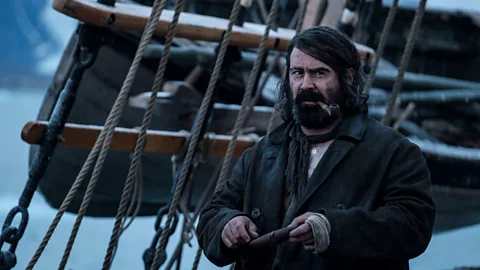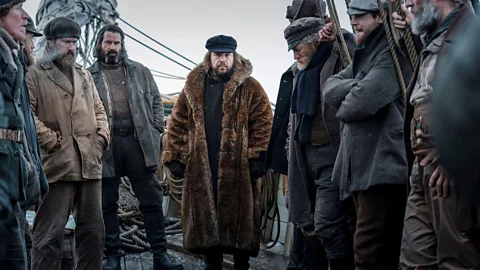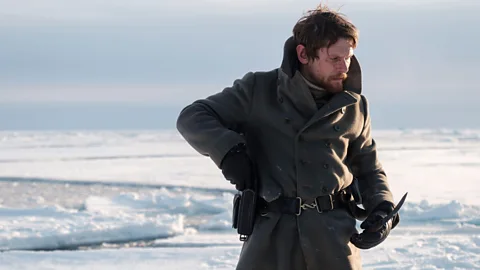Why The North Water is the best TV series you missed in 2021
 Alamy/See-Saw Films
Alamy/See-Saw FilmsA period drama like no other, this gut-wrenching show about a doomed voyage in the Arctic flew under the radar last year. Christina Newland explains why it deserves belated attention.
A five-part miniseries set in the 19th Century – with episode titles like We Men Are Wretched Things and To Live is to Suffer – might be what you would call a 'hard sell' for audiences these days. In a world awash with streaming content, and where escapism never seemed more appealing, it's easy to see how The North Water flew under the radar when it premiered last year, on AMC's streaming service AMC+ in the United States and on the BBC in the UK. It's a prickly endeavour, after all.
More like this:
Writer-director Andrew Haigh, known best for articulate independent dramas like Weekend (2011) and the lauded 45 Years (2015), has pursued a brisk change of pace with his adaptation of Ian McGuire's 2016 novel. The North Water features sexual violence and animal cruelty among its myriad other horrors. As Haigh tells BBC Culture: "We knew from the start it wouldn’t be for everyone."
 Alamy/See-Saw Films
Alamy/See-Saw FilmsBut the surface roughness of this bleakly beautiful series belies a courageous intelligence that means if there's any show from 2021 that deserves some belated attention, it's this one. It focuses on the hardscrabble struggles of working men circa-1859 on a whaling ship setting out for the far reaches of the Arctic. And systematically, over the course of its five episodes, it casts off the assumptions of an audience who may expect it to be a simple tale of macho survival in an Arctic wasteland (not quite) or a more genteel period drama that happens to be set on a ship (definitely not). It's the rare piece of televisual art that is not afraid to risk scaring off an audience. But if you're hardy enough to reach the finale, its rewards are rich.
The force-of-nature acting
Jack O'Connell, the firecracker leading man, began working in his youth on Skinsand moved on to front brilliant British-led films like prison flick Starred Up (2013) and Belfast-set '71 (2014), both deeply embodied physical performances. Here he stars as Patrick Sumner, an ex-army surgeon of Irish origin who has been booted out for mysterious reasons. Sumner seems to be a man of reason and civility, but he's nursing a laudanum habit –19th-Century opium – and a dark past in colonial India, glimpsed in flashback. Sumner signs on to board the whaling ship as its doctor, captained by a shifty veteran of the sea (Stephen Graham, always captivating) who, it turns out, has ulterior motives for their journey.
Among the rough-and-ready crew, whose tough lives are spent clubbing seals, harpooning whales, and trying to fend off frostbite, scurvy, and shipwreck, there's one man who stands out as the most dangerous of the bunch: Henry Drax (Colin Farrell). Each of the three lead actors are forces of nature in their own right, and they perform with a brittle brilliance. O'Connell in particular is phenomenal as a man desperately tussling to seem in control, even as he is increasingly out of his depth. His rascally quality is used to his strength here; in spite of his restrained, learned character, there's a touch of scrappiness beneath which suits the wild backstory of Sumner's army days.
"To want to tell an addict's story was interesting to me. To be hopelessly dependent on a substance is a hell-on-earth type of situation," O'Connell says, speaking on a group video call with Haigh. "So to consider that, in an area that I obviously have no experience of, was very exciting. And to put that in the centre of that piece, it gives you this opportunity to welcome an audience in."
As the ship moves further north, things begin to deteriorate between the men onboard, with a tangle of mercenary impulses, violence, and suspicion compounded by bad luck. And again, the series does all of the things that audiences may look askance at: it is unabashedly slow-burn, seeming like it could be a companion piece to AMC's other period, ship-bound series The Terror minus the supernatural, or a survivalist thriller in the style of The Revenant, or a whodunit in the confined space of a ship at sea – until it isn't any of those things at all. Instead, it is more profound than that: a meditation on the link between masculinity and empire, the poison of colonialist thinking and its cruelty to the environment around us.
 Alamy/See-Saw Films
Alamy/See-Saw Films"I always wanted the audience to feel, I guess, at sea," Haigh says. "So they were never quite sure what this was going to become or what it was. I also think that, you know, to put it bluntly, [what sets it apart is] it's not about a lot of posh people on a ship, or in a big house. Whalers were working-class men." (And as such, there's some sly commentary in the show about who gets their hands dirty while rich women wear fancy perfume reaped from the slaughter of sea life.)
The authentically testing shoot
The fact that it was partly filmed in the Arctic Circle – and on a ship where much of the cast and crew lived in cramped quarters together throughout a three-week shoot – inevitably heightened the authenticity for those involved. The frostbitten, harried faces of the cast were true to life: some of The North Water was made in the Northernmost reaches of the world that had ever been home to a film crew. "It was challenging, of course," Haigh says. "It's not going to be easy, living on a boat for all that time. But I think, for me, and I think for most of the cast, Jack included, we relished being up there. It felt like we were separate from the world, which is what these men were when they were on the whaling ship."
And being in such a remote location had its perks. O'Connell and some of his fellow cast did cold-water dives and spotted polar bears from their ship. In a practical sense, too, Haigh says, he benefited from the remoteness as a director. "There were no execs on the ship, and no one could even see any dailies. There was no internet, and no way to transport anything back because we were on a ship in the middle of the ocean," he laughs.
"Once you've been there, you come back and think: did we do that">window._taboola = window._taboola || []; _taboola.push({ mode: 'alternating-thumbnails-a', container: 'taboola-below-article', placement: 'Below Article', target_type: 'mix' });
